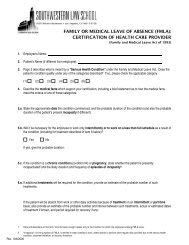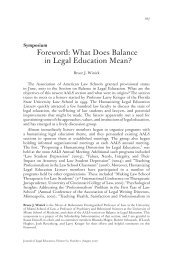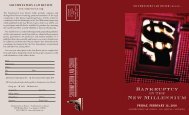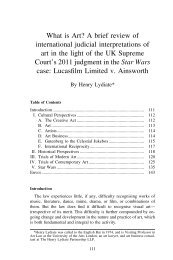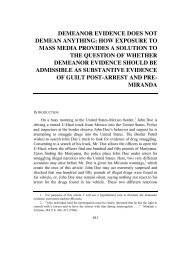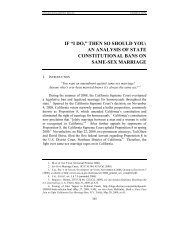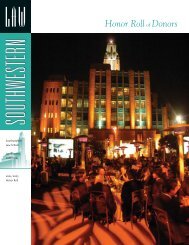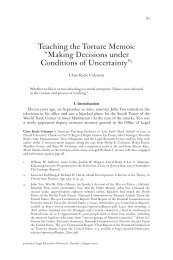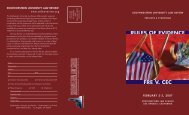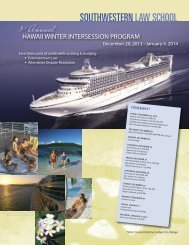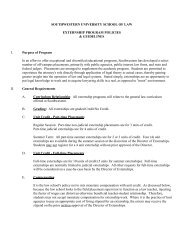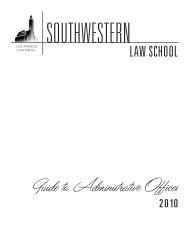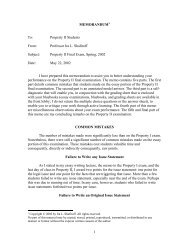An Autobiography of a Digital Idea - Southwestern Law School
An Autobiography of a Digital Idea - Southwestern Law School
An Autobiography of a Digital Idea - Southwestern Law School
Create successful ePaper yourself
Turn your PDF publications into a flip-book with our unique Google optimized e-Paper software.
<strong>An</strong> <strong>Autobiography</strong> <strong>of</strong> a <strong>Digital</strong> <strong>Idea</strong><br />
505<br />
pertinent questions when they are young associates and I am not there to<br />
consult about research and writing projects. I use interactive materials, class<br />
discussions, group activities, and exercises from the e-book itself instead <strong>of</strong><br />
lecture or the Socratic Method. “Learning does not happen when someone<br />
tells you something new. We hardly can do anything new after just listening.” 57<br />
Instead, students learn by doing. The more I can get students doing in the<br />
classroom, the more they will understand and retain the material.<br />
Second, my role in class also has changed dramatically. I now focus not<br />
only on how I teach but also on how students process what I teach. 58 By taking<br />
into account the way students learn in class, I have adjusted my teaching.<br />
While I still may stand in front <strong>of</strong> the class, I am no longer always the focal<br />
point nor are students merely receptacles ready for all the knowledge I pour<br />
into their minds. Instead, I <strong>of</strong>ten am a facilitator, helping students learn from<br />
each other. Students no longer need to trust only me; they can trust each other,<br />
and more importantly, learn to trust themselves. As a result, students in class<br />
have transformed from passive participants to active learners and discoverers. 59<br />
Third, I use a variety <strong>of</strong> pedagogical techniques to facilitate learning in<br />
the classroom. I use both online exercises and annotated samples from<br />
Teaching<strong>Law</strong>.com to help facilitate that learning. I also take advantage <strong>of</strong> the<br />
students’ desires to multitask, telescope, and simultaneously open multiple<br />
windows so the classroom mirrors their learning styles.<br />
The online exercises in Teaching<strong>Law</strong>.com are particularly useful for<br />
collaborative learning environments. For example, I will assign an online,<br />
peer review exercise as an out-<strong>of</strong>-class assignment. The students download<br />
the assignment, upload their peer’s document, and then do the exercise as<br />
part <strong>of</strong> their reading assignment. In class, students discuss the peer review<br />
assignment with an assigned partner. My role in this part <strong>of</strong> class is to facilitate<br />
specific, insightful discussions with peer groups; I walk around and ask as well<br />
as answer questions in the student pairings. Students learn this way through<br />
discovery—discovery <strong>of</strong> their peers’ writing. They ask insightful questions that<br />
easily transfer to their own writing. In the next part <strong>of</strong> the class, I will lead a<br />
general discussion with the whole group to address common concerns and<br />
issues. These discussions help each student home in on specific issues and<br />
learn about general problems affecting the whole class. Here, I try to talk as<br />
little as possible and let the students feed <strong>of</strong>f each other. The more students<br />
talk during these sessions, the more they learn and the more knowledge they<br />
can apply to their future assignments.<br />
57. Aldrich, supra note 32, at 85.<br />
58. See Rogelio Lasso, From the Paper Chase to the <strong>Digital</strong> Chase: Technology and the Challenge<br />
<strong>of</strong> Teaching 21 st Century <strong>Law</strong> Students, 43 Santa Clara L. Rev. 17 (2002) (“Teacher-centered<br />
pedagogy impedes success in the classroom, the principal flaw being that it focuses on how<br />
teachers teach without taking into account how students learn.”).<br />
59. Carlie Windham, Father Google & Mother IM: Confessions <strong>of</strong> a Net Gen Learner, Educause<br />
43, 52 (2005).



